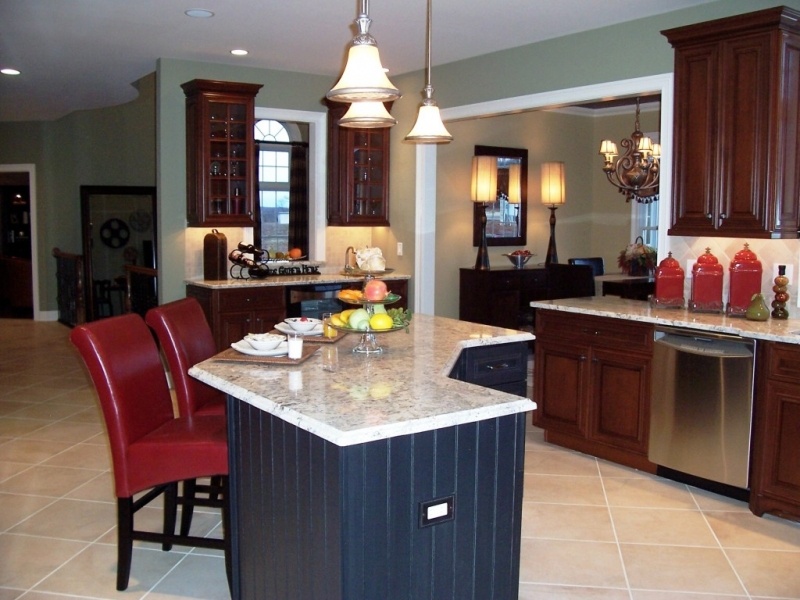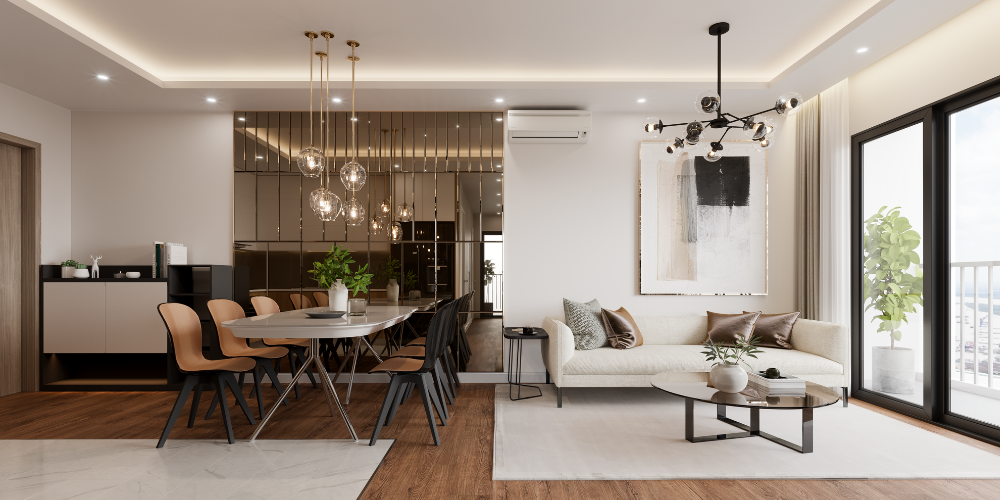Are you planning a move but can’t decide if an older home or new construction is the right option for you? Although an older home may offer the character you want, these homes often need costly repairs and renovations that can break your budget.
Too often, buyers only look at price tags and don’t consider long-term costs when purchasing homes. That spacious four-bedroom colonial in a brand new community may be a little more expensive than an existing home, but the money you’ll pay to maintain the older home will negate the cost difference.
For most buyers, buying a new home is the better option. Take a look at a few reasons why it makes more sense to choose a new home.
Maintenance Costs Are Minimal
If you’ve lived in an older home before, you know that maintenance costs can be high. Roofs leak, appliances wear out and old sewer lines crumble into the ground. Even seemingly minor repairs can cost more than expected. Replacing a switch on your furnace, an inexpensive fix for new units, can be very expensive if very few companies make the parts needed to service your antiquated furnace.
You’ll also spend more on retrofitting your 20th century home to fit your 21stcentury lifestyle. Do you want to add a dishwasher and a microwave to your 1957 kitchen? Both of those appliances require dedicated circuits. If your electrical panel doesn’t have enough free circuits available, you can expect to pay at least $1,000 for a new panel, in addition to buying the appliances and paying for the services of an electrician.
Depending on the age and condition of your home, you may need to devote a significant percentage of your monthly income to repairs. A 2010 Homewyse report noted that homeowners pay an average of $12,574 in maintenance and repair costs for a 2,450-square-foot-home. New homes do eventually become old homes, but if they’re built with quality materials, you can expect to see a significant reduction in maintenance costs for years.
Maintenance costs aren’t just less expensive because every square inch of your home is new. Products used today are better able to stand the test of time. Wooden decks eventually rot no matter how often you seal them, but composite materials last indefinitely. Galvanized steel pipes, once the standard for home construction, corrode and leak. Today, home builders use highly durable plastic or copper pipes instead.
New home builders specifically look for products that are designed to last longer and require less maintenance. When you buy a new home, you’ll get to spend more of your discretionary income on the things you enjoy, rather than on repairs.
Warranties Cover Things That Can Go Wrong
Most new home communities offer warranties that cover leaks, defects and other maintenance issues that occur during the first year. If a product or system is defective or wasn’t installed correctly, there’s a good chance it will fail within that time period or you’ll notice a problem. Warranties provide important protections and ensure that your new home doesn’t turn into a money pit.
Warranties typically cover:
- Structural Defects: If cracks occur as your home settles or a foundation issue threatens the structural integrity of your home, your warranty will cover repairs.
- Flooring: Problems in the subfloor, tiles or wood or laminate flooring can cause floors to warp or dent. Warranty protections also extend to carpets. If the carpeting is loose or defective, your builder will repair or replace it.
- Plumbing: Although plumbing issues aren’t usually a problem in new homes, warranty coverage provides peace of mind should you experience a leak.
- Doors and Windows: Improperly installed doors and windows, condensation between glass panes and leaks are generally covered by home builder warranties.
- Heating and Cooling Systems: There’s nothing worse than waking up to a freezing home on the coldest day of the winter because your heating system stopped working. Warranty coverage ensures that you won’t have to scrape together the money to pay for an expensive repair if these key systems fail.
- Grading: Water damage isn’t just caused by leaking pipes or gaps around doors or windows. Poor grading outside your home can direct rainwater into your home instead of channeling it away from your foundation. If you experience a moisture problem due to grading, your warranty will cover re-grading your lot.
New Homes Are More Energy Efficient
Thanks to advances in building technology and materials, new homes are incredibly energy efficient. The introduction of zone heating and cooling means that you no longer have to blast the air-conditioning downstairs to ensure that second-floor bedrooms stay cool and comfortable. Energy efficient appliances, high-value insulation and multi-pane windows, typical features in new homes, help keep your utility and heating bills lower.
Older water heaters, furnaces and HVAC systems tend to be less efficient than newer models. Although homeowners may plan to replace those items after they move in, in reality, many don’t get replaced unless they stop working.
No Need for Renovations
When you buy an older house, it’s important to look beyond the pink bathroom or orange kitchen counters and imagine how updates would transform the home. Unfortunately, renovating kitchens and bathrooms can be very expensive. According to the 2017 Cost vs. Value Report, homeowners spend $20,830 for a minor, mid-range kitchen remodel and $62,158 for a major remodel. Upscale remodels cost even more.
Even if you plan to do the work yourself, you’ll still pay thousands for cabinets, counters, lighting and building supplies. Plus, you’ll waste valuable time that could be better spent participating in a favorite hobby or enjoying a little downtime with your family.
Many people buy older homes that don’t really fit their needs. They settle for a home with one bathroom when they really need two, or choose a three-bedroom home when they want four bedrooms. Although you can always add on a bedroom or bathroom later, building additions are costly. It’s much cheaper to buy a house that already has the bedrooms, bathrooms and floor plan you need.
Renovations can be more expensive than you expect. It’s not unusual to remove drywall during a kitchen remodel and find extensive termite damage, rot or leaks. At that point, there’s no other choice but to pay to correct the problem, even if the repair will drain your savings.
Less Risk of a Fire
Wood, one of the primary building materials in older homes, is also one of the most flammable. A small kitchen fire can quickly engulf your entire home if a significant percentage of it is built with wood.
New homes feature fire retardant carpeting and insulation, ember-resistant siding and fire-rated roofing materials that help prevent fires or slow down the spread of the flames.
Although homeowner’s insurance covers fires, you may not be reimbursed for every cent of your rebuilding costs, particularly if you don’t review and upgrade your policy regularly. When you buy a new home, your risk of experiencing a fire decreases significantly.
Easy Access to Amenities
Older homes are often found in inner ring suburbs. Although those suburbs may have offered plenty of stores, restaurants, banks, medical offices and workplaces in the 1950s or 60s, in many cases, businesses followed the flow of homeowners to new communities located farther away. If you buy an existing home in an older community, you can expect to spend more on transportation costs to travel to businesses and recreational activities.
In addition to increased spending for gas, vehicle maintenance and public transportation, it’s also important to consider the intangible costs of living in an older neighborhood. When you spend 1 ½ hours commuting to work daily or have to drive for miles just to buy a half-gallon of milk, you lose important time that you could be spending with your family or enjoying a little rest and relaxation.
Before you make an offer on your next home, carefully consider the many advantages of new construction. New homes offer the perfect option for budget-conscious homeowners who don’t want to waste time or money on home repairs and renovations.
Would you like to learn more about the many amenities and features offered at Country Classics' new home communities? Use this convenient form to contact us.
Sources:
Home Advisor: How Much Does It Cost to Upgrade an Electrical Panel?
http://www.homeadvisor.com/cost/electrical/upgrade-an-electrical-panel/
Homewyse: Homewyse 2010 Home Ownership cost Report
https://www.homewyse.com/documents/HomewyseOwnership2010.pdf
Remodeling: 2017 Cost vs. Value Report
http://www.remodeling.hw.net/cost-vs-value/2017/
U.S. News and World Report: 9 Reasons to Buy a Newly Built Home








Leave a Comment